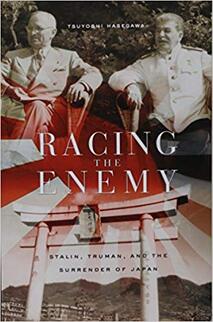Home | Chronology |
|
1945
"The New Year saw the Soviet liberation of Auschwitz, and the revelation of the sickening obscenity of the Holocaust, its scale becoming clearer as more camps were liberated in the following months. The Soviet army continued its offensive from the east, while from the west the Allies established a bridge across the Rhine at Remagen, in March. While the bombing campaigns of the Blitz were over, German V1 and V2 rockets continued to drop on London. The return bombing raids on Dresden, which devastated the city in a huge firestorm, have often been considered misguided. Meantime, the Western Allies raced the Russians to be the first into Berlin. The Russians won, reaching the capital on 21 April. Hitler killed himself on the 30th, two days after Mussolini had been captured and hanged by Italian partisans. Germany surrendered unconditionally on 7 May, and the following day was celebrated as VE (Victory in Europe) day. The war in Europe was over. |
|
In the Pacific, however, it had continued to rage throughout this time. The British advanced further in Burma, and in February the Americans had invaded Iwo Jima. The Philippines and Okinawa followed and Japanese forces began to withdraw from China.
Plans were being prepared for an Allied invasion of Japan, but fears of fierce resistance and massive casualties prompted Harry Truman - the new American president following Roosevelt's death in April - to sanction the use of an atomic bomb against Japan.
Such bombs had been in development since 1942, and on 6 August one of them was dropped on the Japanese city of Hiroshima. Three days later another was dropped on Nagasaki. No country could withstand such attacks, and the Japanese surrendered on 14 August.
The biggest conflict in history had lasted almost six years. Some 100 million people had been militarised, and 50 million had been killed. Of those who had died, 15 million were soldiers, 20 million were Russian civilians, six million were Jews and over four million were Poles."
Source: BBC
Plans were being prepared for an Allied invasion of Japan, but fears of fierce resistance and massive casualties prompted Harry Truman - the new American president following Roosevelt's death in April - to sanction the use of an atomic bomb against Japan.
Such bombs had been in development since 1942, and on 6 August one of them was dropped on the Japanese city of Hiroshima. Three days later another was dropped on Nagasaki. No country could withstand such attacks, and the Japanese surrendered on 14 August.
The biggest conflict in history had lasted almost six years. Some 100 million people had been militarised, and 50 million had been killed. Of those who had died, 15 million were soldiers, 20 million were Russian civilians, six million were Jews and over four million were Poles."
Source: BBC
Books
